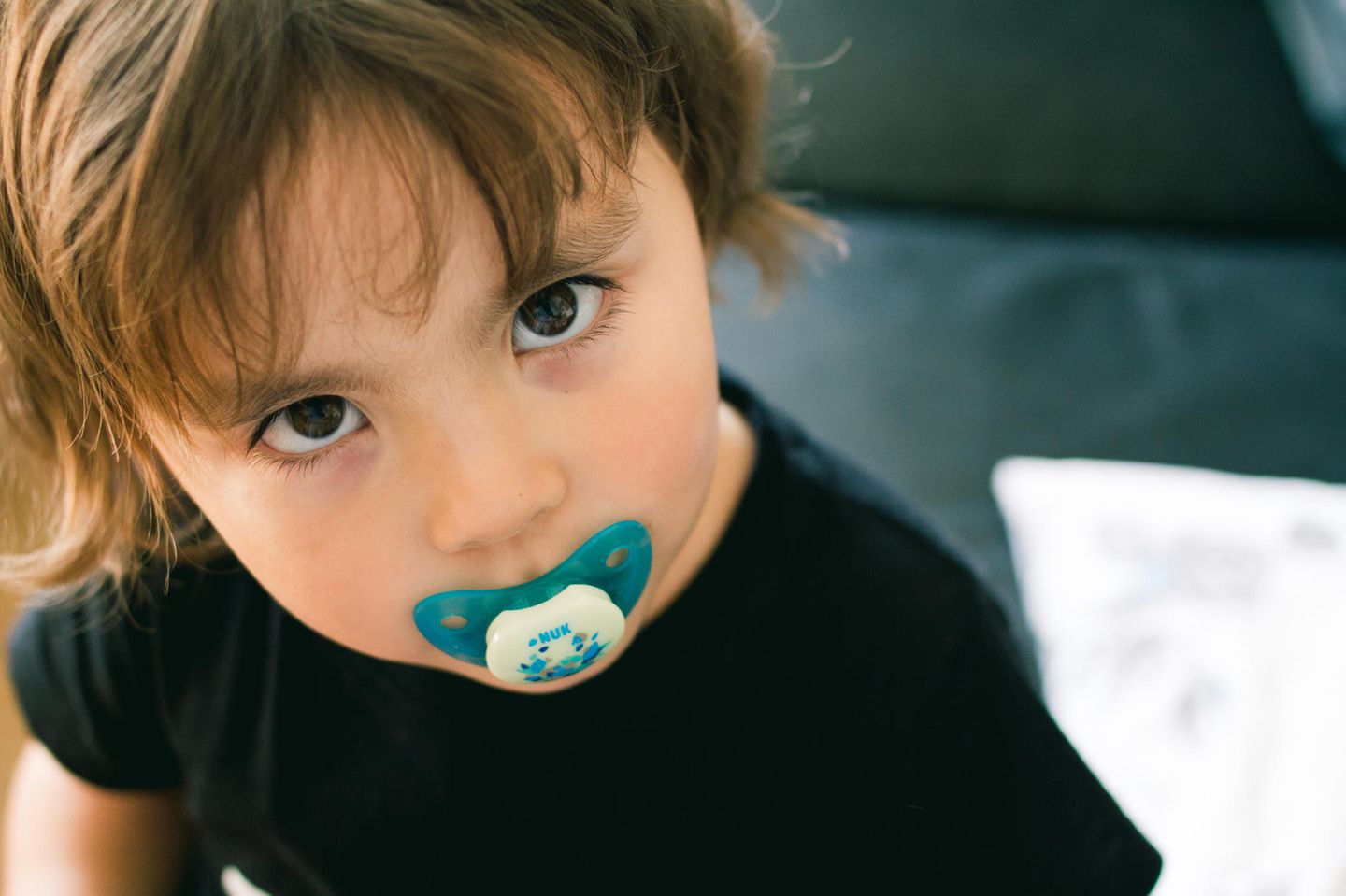family column
When the baby is stuck on the pacifier

© michelexolaya / Adobe Stock
Our author Nora knows the arguments against pacifiers. But sometimes babies just need their pacifier and that’s totally fine — she thinks so. Here she explains why.
What complete nonsense this is, I learned after the birth of my second child. Because while my first child was obviously able to satisfy his need to suckle at my breast on his own, sucking during meals was obviously not enough for my second child. Instead, he madly sucked on anything he could get his mouth on: the buttons of my cardigan, the corner of my nursing pillow, his own hands. Meanwhile, he screamed very loudly and very desperately. Until I gave him a pacifier. Then he became calm and content – and sometimes he even fell asleep in the pram.
What if a baby needs a pacifier longer?
None of my children have used the pacifier like this. My third and fourth children also had one when they were little, but only for a short time. Not for pedagogical reasons, but for lack of interest. They sort of kept losing their pacifiers and didn’t really seem to miss them. However, my second son not only loved his pacifiers, he needed them. Fall asleep, calm down, feel safe. In bed at home and in kindergarten, on long car trips and to the pediatrician. And not only as a child, but also well beyond the second birthday. As a result, the same experts who applauded us so much when we had our first child now frowned upon seeing our baby with the pacifier and decided the pacifier had to go.
Many parents are familiar with these cautionary looks. They are especially common in dental offices. Parents are often told that they really need to assert themselves now and children that they have already grown up. If you then try to put the baby to bed in the evening without his beloved pacifier, the drama is often great. The little ones scream, cry, beg for their pacifier for hours, and the parents get lost in confused discussions about pacifier fairies and pacifier trees. Eventually, everyone feels bad.
Important for the soul
Because a pacifier is not just a plastic teat. It is a piece of emotional security for parents and children. Regulatory help that is often there when nothing else helps. And not because parents are too lazy to calm their baby. It’s because some children need more than holding hands and singing songs to calm their overexcited nervous systems. Sucking is and remains our oldest and most effective self-soothing strategy. Even unborn babies suck their thumbs. Newborns calm down when they suckle at the breast. And all over the world, parents have been inventing pacifier-like sucking opportunities for their babies for centuries: On an altarpiece in Aschersleben from the 15th century, the infant Jesus is even sucking on a so-called lollipop bag, as the very first forerunners of the pacifier were called. It is not known what it did to the position of his teeth.
My pacifier baby’s teeth are fine though. And this is the case with most children. Because even though there are studies that actually show that pacifiers can have a negative effect on young children’s jaws and teeth, the studies don’t talk about ordinary pacifiers, but about excessive pacifier consumption – that is, children who don’t take the pacifier out of their mouth day after day. Furthermore, all studies of pacifier use have the major weakness of focusing on only one aspect of child development: dentists look to teeth, speech therapists to speech development, ear, nose and throat doctors to the slightly increased risk of middle ear infections in children with pacifiers. But children are more than their teeth, their tongues and their ears. They are little people with their own regulatory needs and strategies – and changing them takes time and patience and certainly no pressure. That’s why I never took the pacifier off my pacifier baby. Instead, my pacifier handling became increasingly careless over time. Sometimes I didn’t have one with me on the playground, sometimes I forgot to take one to my grandparents. And then it went without, little by little. My son learned new strategies to calm down and eventually forgot to ask for his pacifier when he fell asleep. Maybe dentists are writing me angry letters now. I adhere to: Pacifiers may not be great for the teeth, but sometimes they’re important for the soul. And then simply taking them off a child would be disproportionate and petty.
Nora Imlau writes as a freelance author for ELTERN, has a successful blog (www.nora-imlau.de) and good luck with bestsellers such as “So much joy, so much anger”, Kösel, 20 euros, or “My family’s compass”, Ullstein, 22.99 euros.




